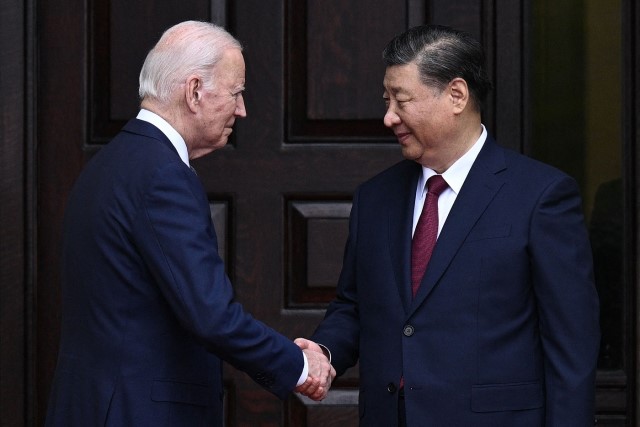UNITED STATES: In a significant speech after his bilateral summit with President Biden in San Francisco, Chinese President Xi Jinping addressed the American people, not just the business audience present in the room. Xi honored the historic Sino-American alliance, stressing the need to strengthen ties and enhance people-to-people exchanges. He also announced plans to invite 50,000 young Americans to China for exchange programs over five years.
During the summit, the two leaders agreed to support the G20 Leaders Declaration to pursue efforts to triple renewable energy capacity globally by 2030. They also agreed to pursue law enforcement coordination on counternarcotics, including on the illicit production of fentanyl. The two sides announced the resumption of military-to-military communications, put on hold by China since US Speaker of the House Nancy Pelosi visited Taiwan in 2022. They also affirmed the need to address the risks of advanced AI systems and improve AI safety through talks.
The meeting comes at a pivotal time in US-China relations as the two leaders seek to reduce friction and forge new areas of cooperation. Given the tailspin in bilateral relations, expectations for the meeting were exceedingly low. Yet the two leaders were able to agree on a set of modest proposals on climate and dialogues to stabilize the relationship going forward.
China also released its long-awaited Methane Emissions Control Action Plan, primarily concerned with improving the monitoring, reporting, and verification system for methane emissions and increasing controls in the energy, waste, and agriculture sectors. The plan reinforces global methane exchanges and cooperation through China’s preexisting “Belt and Road” International Green Development Coalition and South-South cooperation on climate change initiatives.
China’s state security chief Chen Yixin concluded a rare 10-day tour of Southeast Asia last week, highlighting Beijing’s push to build security relationships in a key area of geo-strategic competition between the US and China. During his visit, Chen engaged in high-level discussions with national leaders and intelligence officers from Cambodia, Vietnam, and Thailand and reached an “extensive consensus” on security and intelligence cooperation.
6-point summary of what Xi said in San Francisco
- The Flying Tigers: Xi honored the historic Sino-American alliance, stating, “The Chinese people never forget the Flying Tigers … These stories … will be passed on from generation to generation.”
- 2911 Bonnie Drive: Recalling his first stay in the United States (at that address), Xi reflected, “They represent America to me … a strong current of goodwill and friendship across the Pacific Ocean.”
- People-to-People Bonding: Xi stressed strengthening ties, enhancing people-to-people exchanges, increasing direct flights, initiating high-level tourism dialogues, and simplifying visa procedures.
- Youth Exchanges: Xi announced plans to invite 50,000 young Americans to China for exchange programs over five years.
- U.S.-China Counternarcotics Cooperation: A new working group will be established to address drug abuse, and Xi expressed, “China sympathizes deeply with the American people, especially the young, for the sufferings that Fentanyl has inflicted upon them.”
- Pandas’ Return: Xi committed to panda conservation cooperation, and acknowledged their role as symbols of friendship, notably for Californians and the San Diego Zoo.”
The meeting between Presidents Biden and Xi signifies a notable shift in US-China relations from China’s perspective, with both sides agreeing to cooperate on climate and counternarcotics efforts, as well as restart military dialogue. The meeting comes at a pivotal time in US-China relations as the two leaders seek to reduce friction and forge new areas of cooperation.

